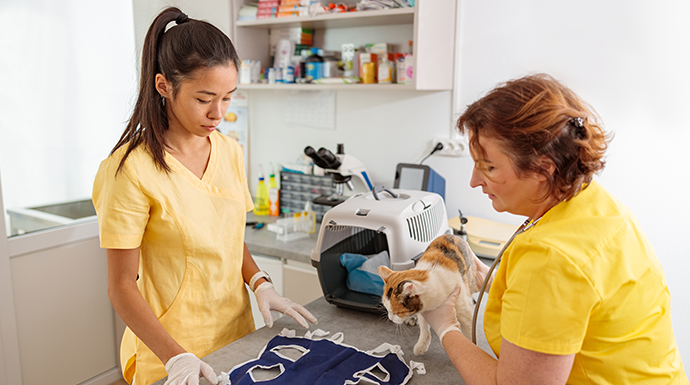You may not know this, but there’s a whole week dedicated to recognizing the hard work of veterinary technicians. Founded by the National Association of Veterinary Technicians in America (NAVTA), National Veterinary Technician Appreciation Week takes place every October 13-19. The goal is to shine a light on the incredible contributions vet techs make in animal healthcare and raise awareness of just how critical they are to every veterinary practice.
Vet technicians handle everything from assisting in surgeries to providing comfort to the pets and families who come through the doors of every practice. With over 120,000 veterinary technicians across the U.S. and growing demand for their skills, they’re essential to keeping clinics running smoothly. This week is all about giving them the recognition they deserve for everything they do in front of and behind the curtain.
Pet care experts
Veterinary technicians handle much of the hands-on work that keeps things running smoothly in vet clinics, keeping pets comfortable and calm, and families confident and secure in their choice of your clinic. From assisting with lab tests to monitoring anesthesia and comforting animals during procedures, there is no veterinary practice without the skilled technicians.
- There are 125,700 veterinary technicians working across the U.S., and demand is expected to grow by 19% by 2033, significantly faster than the average for other professions (Bureau of Labor Statistics).
- Veterinary technicians perform over 50 different clinical tasks, including diagnostic tests, anesthesia monitoring, and surgical assistance (Bureau of Labor Statistics).
- 88.6% of vet techs are women, with an average age of 32 (Data USA).
- Vet techs have to continually update their knowledge. Most states require them to complete continuing education courses every two years to maintain their licensure - anywhere between 20 and 80 hours of continuing education (AAVSB)
Without the support of veterinary technicians, clinics would struggle to deliver the level of care that brings families back again and again over the years.
Emotional labor and compassion fatigue
The emotional toll in every practice is heavy. Veterinary mental health is an important issue across the board.
Because of the nature of vet tech work, they form close bonds with the animals and families they meet every day. They’re often the ones comforting pet owners during illnesses, injuries, and at the end of a pet’s life. This emotional burden is one of the most challenging aspects of the job.
Compassion fatigue is a significant issue in the profession, with over 70% of vet techs reporting high levels of emotional exhaustion, with vet techs reporting challenges after dealing with euthanasia and caring for abused animals (Today's Veterinary Business).
This kind of emotional labor can lead to burnout, which is one of the top reasons technicians leave the field. In fact, a survey reported by Today’s Veterinary Business found the main factors driving vet techs away from the profession are:
- Burnout
- Low wages
- Toxic work environment
The emotional connection vet techs have with both animals and their families makes their role invaluable, but it also means they carry a heavy mental load. Providing support to both the physical and emotional needs of the animals they care for requires compassion, resilience, and emotional strength.
It’s important to check in on your vet techs consistently. And this week serves as a good reminder to get into the habit.
Challenges in compensation and recognition
Despite their vital contributions, veterinary technicians are often underpaid for the level of skill and emotional labor they provide.
- The average salary for a veterinary technician in the U.S. is about $43,740 per year (Bureau of Labor Statistics).
- This is 40% less than the national median for all occupations, despite the high demand for their expertise (Bureau of Labor Statistics).
- Many vet techs make around $17.72 per hour, which is below the living wage in many areas of the country (Today's Veterinary Business).
While vet techs perform highly skilled tasks - like anesthesia monitoring, lab work, and some diagnostic testing - they are rarely compensated accordingly. Compensation issues are one of the leading reasons many technicians leave the profession. As noted in the previous section, a recent survey revealed the top reasons for vet techs leaving include:
"Low wages, burnout, and toxic work environments."
- Today's Veterinary Business
Still, vet techs continue their work out of a commitment and passion for animals. This dedication is what makes veterinary technicians stand out, even when their compensation doesn’t always reflect the value of their role.
A heartfelt thank you to veterinary technicians
To all the veterinary technicians out there, we want to extend a heartfelt thank you. Your dedication, compassion, and tireless work make a world of difference to the animals and families you care for.
Whether you're holding a pet's paw during a tough procedure, comforting an anxious family, or managing complex medical equipment, your contributions are invaluable.
During National Veterinary Technician Appreciation Week, and every week, we celebrate you.
You are the backbone of every veterinary practice, and we recognize the emotional and physical demands that come with your role. You give so much of yourself for the sake of your patients, often putting their needs before your own.
We invite everyone - veterinary practice owners, vets, and pet owners - to join us in appreciating the incredible work vet techs do. Your compassion and dedication never go unnoticed, and we are grateful for everything you do.
Thank you for making the world a better place, one animal at a time.
Help your vet techs do their jobs well (and manage the emotional burden they carry)
We spend a lot of time thinking about how hard your jobs are, particularly when working with animals in critical conditions. We build and service tools that improve patient outcomes, but also make vet techs' jobs less challenging, helping to reduce some of the mental and emotional strain they experience.
Two of our flagship products, the IVetMATE IV fluid warmer and the VetroCRI syringe infusion pump, are designed with this in mind:
- The IVetMATE IV fluid warmer keeps animals warm during treatments (by stopping fluids from lowering their body temperature). This is crucial for improving recovery times, minimizing discomfort, and enhancing the overall treatment process. By providing better care for the patients, it also helps reduce the emotional burden on veterinary technicians, who are often the ones ensuring pets are comfortable and safe during these procedures. Learn more about our veterinary IV fluid warmer here.
- The VetroCRI syringe pump offers precise, controlled delivery of medications and fluids. This allows vet techs to focus less on manually monitoring dosages and more on patient care. With this tool, they know pets get the right treatments at the right times, easing the stress that comes with ensuring proper medication administration. Explore the VetroCRI syringe pump here.
When vet techs have reliable equipment, they can spend more time doing what they love - caring for animals - and less time worrying about whether the tools they’re using are up to the task. It’s one way we show our appreciation for the hard work they do every single day.
Sources:
U.S. Bureau of Labor Statistics | Veterinary Technologists and Technicians
Data USA | Veterinary Technologists and Technicians
AAVSB | Compiled List of Vet Tech Continuing Education Requirements by State @ VETGirl
Today’s Veterinary Business | Where Did All the Vet Techs Go? | December, 2022



